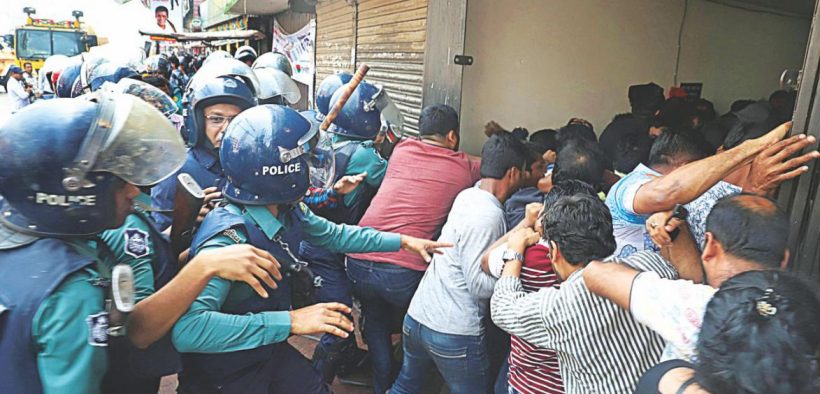Bangladesh: Government must stop high-handedness in opposition harassment

BNP activists scurrying back to their party office in the capital’s Nayapaltan as police charge down on them yesterday. Police used truncheons and water cannons on the protesters demonstrating for being denied permits for a rally on Thursday. Photo: Amran Hossain
The 24-hour transport strike in Khulna beginning on Friday morning — juxtaposed with the rally that mayoral candidates of the Bangladesh Nationalist Party (BNP) , who lost in city corporation elections, planned to hold in Khulna for Saturday — speaks of a government ploy that reeks of high-handedness. The rally, the second in a series of six such events that the defeated city mayoral candidates of the party announced on February 25, is meant to protest against frauds in the city corporation elections and a reported government move for the revocation of the gallantry award given to the late president Ziaur Rahman, also founder of the Bangladesh Nationalist Party and to push for the conduction of elections in a fair manner and an early release of the party’s chairperson. But transport workers in Khulna went on strike for 24 hours beginning on Friday morning on all the 18 routes to and from the city, citing their safety during the rally as a reason. While the Bangladesh Nationalist Party leaders claim that bus owners and workers enforced the strike to stop people from joining the party’s rally, the police set aside the proposition as baseless. A Bangladesh Road Transport Workers’ Federation leader, however, is reported to have said that the police on Thursday asked them to suspend bus services.
The federation seeks to say that it was the workers who made the decision on bus service suspension on their own while the Khulna District Motor Workers’ Union says that it was the work abstention for a day that they sought from the transport owners for rest as they have not had the time to rest after restrictions on transport movement, ordered on March 26, 2020 as a preventive measure against the spread of COVID-19, were withdrawn, which happened in a limited manner on May 31, 2020 and fully on September 1 that year. The narratives suggest that there has been a role that the administration played in transport workers going on or enforcing the strike, or even seeking a work abstention for a day from transport owners who readily agreed, to stop people from joining the rally that the Bangladesh Nationalists Party planned. The party leaders and activists also seek to say that they faced similar obstacles to joining the first rally of the series in Barishal that took place on February 18. The government should stop employing such tactics that in a roundabout way are meant to harass entities in the opposition camp and, by extension, to stop people from voicing their dissent and holding protests. Expressing dissent in cases of issues going awry or holding protests to make voices heard in a peaceful manner is a democratic right of citizens, the absence of which makes democratic dispensation difficult and, at times, almost impossible.
The government must, therefore, stop showing high-handedness in harassing individuals with dissent and groups or political parties in the opposition camp. All this augurs well neither for people nor for political parties as such a proposition, in turn, harms democratic dispensation. The government must also start taking dissenting views and protests positively in the furtherance of the country.
Courtesy: New Age










